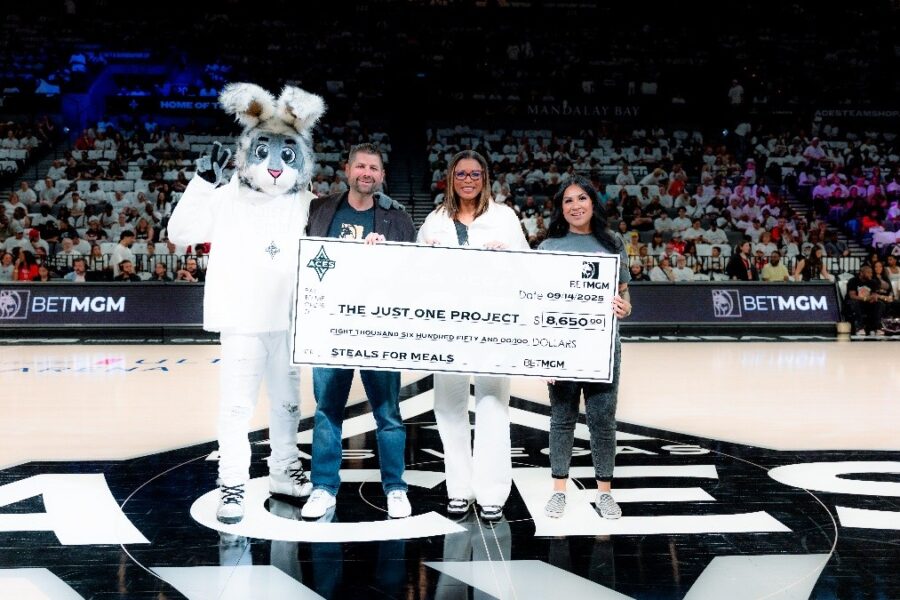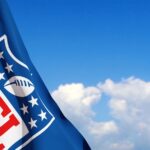BetMGM and the Las Vegas Aces on Friday announced the results of the inaugural “Steals for Meals” initiative.
The Aces of the WNBA team made 173 steals during regular season home games, so BetMGM donated nearly 3,800 meals to The Just One Project, a Las Vegas nonprofit addressing food insecurity in the Las Vegas Valley.
Article continues below ad
The official check presentation took place September 14 during the Aces vs. Seattle Storm opening playoff game, featuring Michael Vricella, Director of VIP Casino Operations at BetMGM; Nikki Fargas, President of the Las Vegas Aces; and Fernanda Tello from The Just One Project.
“Steals for Meals” was launched in May as part of BetMGM’s multiyear partnership with the Las Vegas Aces. For every home game steal during the regular season, BetMGM donated $50 to The Just One Project.
As BetMGM expands into new markets and introduces new features, responsible gaming remains a key focus. BetMGM provides resources to help customers play responsibly including GameSense, developed and licensed to MGM Resorts by the British Columbia Lottery Corporation. Through integration in BetMGM’s mobile and desktop platforms, customers can receive the same GameSense experience as at MGM Resorts properties nationwide. This complements BetMGM’s existing responsible gambling tools which provide customers with an entertaining and safe digital experience.
Dig Deeper
The Backstory
Why the partnerships matter now
BetMGM has spent the past two seasons tightening its ties to Las Vegas and national sports brands, positioning itself for a pivotal year in U.S. wagering. Its multiyear deal to become the
official and exclusive sportsbook and casino partner of the WNBA’s Las Vegas Aces through 2027 marked a first for the operator with a women’s professional franchise and extended its reach at Mandalay Bay’s Michelob ULTRA Arena, where the Aces play. Executives framed the move as both a commercial and community play, leveraging on-site branding, VIP fan experiences and co-branded digital content while signaling a commitment to local causes.
That community pitch surfaced again when BetMGM and the Aces reported outcomes from the inaugural “Steals for Meals” program, pledging $50 for each regular-season home-game steal to The Just One Project. The Aces generated 173 steals and BetMGM
donated nearly 3,800 meals, with a check presentation during the Sept. 14 playoff opener. The initiative dovetails with BetMGM’s emphasis on responsible gaming tools, including its integration of GameSense into desktop and mobile platforms. The brand alignment—elite women’s basketball on the Strip paired with local philanthropy and player-safety messaging—has become a key part of the company’s narrative as competition intensifies ahead of peak football season.
Marketing muscle meets mainstream sports
Beyond arena signage and VIP activations, BetMGM has turned to celebrity endorsements to widen its audience. Baseball Hall of Famer Derek Jeter recently signed on as a brand ambassador, with a national campaign launch and plans for a
Jeter-themed online slot game. He joins a roster that includes Wayne Gretzky, Tim Howard and Barry Sanders, reinforcing BetMGM’s cross-sport appeal and ability to draw casual fans into regulated betting and iGaming ecosystems. The approach mirrors a broader industry push to convert fandom into wagering, especially as legal markets mature and operators look for efficient customer acquisition channels.
These campaigns are timed for maximum impact. The NFL window is the most important stretch of the year for sportsbooks, and executives have flagged robust momentum. DraftKings’ chief executive reported “record numbers” heading into kickoff, while BetMGM called the prior week its best revenue week to date with
pre-season volume up 30%. The American Gaming Association projected legal betting could rise 8.5% this season to $30 billion. Stability in engagement and bet size suggests that, despite macroeconomic noise, the customer base remains resilient. Even so, companies are calibrating product expansion. FanDuel’s link with a major exchange underscores the lure of prediction markets, but MGM’s chief executive warned such products could invite new federal scrutiny—an illustration of how growth ambitions are tempered by regulatory risk.
The regulatory squeeze on the illegal market
As legal sportsbooks scale up, state officials are escalating calls to curb illicit offshore wagering that siphons customers and tax revenue. Nevada Attorney General Aaron Ford joined a bipartisan group urging the U.S. Department of Justice to use existing tools—from domain seizures to payment blocks under the Unlawful Internet Gambling Enforcement Act—to disrupt illegal operators that he said threaten consumers and weaken regulated markets. In a recent letter highlighted by state officials, Ford warned that illicit online gambling, estimated at $400 billion in annual revenue, could cost states up to $4 billion in taxes and penalize Las Vegas Strip casinos already fighting to regain their pre-recession footing. The plea amplifies concerns that
about 40% of U.S. sports betting occurs on illegal sites, a figure long cited by industry trade groups.
The American Gaming Association has pressed for coordinated action, publishing research that sizes the illegal market and outlines harms to consumers and licensed businesses. Its analysis is accessible in a
2023 report estimating the scope of unregulated gambling. Ford’s office, for its part, has moved to raise the issue’s profile nationally; the Nevada attorney general’s
public statement urging federal action cites consumer protection and market integrity as core justifications. For operators like BetMGM, the thrust is clear: invest in community-facing and compliance-first narratives while regulators attempt to level the playing field against offshore sites that undercut pricing and promotions without adhering to rules.
Las Vegas stakes and Strip strategy
The Aces partnership intersects with BetMGM’s physical footprint at Mandalay Bay and its parent MGM Resorts’ presence on the Strip. Branding inside Michelob ULTRA Arena and hospitality-driven VIP offers fold sports betting into the broader Las Vegas experience, a synergy that can deepen loyalty and cross-sell to resort amenities. That matters as the Strip confronts slowing metrics since last summer in hotel occupancy, convention attendance and passenger traffic at Harry Reid International Airport, according to state economists quoted by Nevada officials. Community initiatives like “Steals for Meals” also help differentiate the brand in a market where every extra touchpoint—on the court, on the app or in the resort—can influence share during the NFL season and beyond.
The offshore threat intensifies the focus on regulated operator advantages: consumer protections, responsible gaming tools and the ability to coordinate with law enforcement and financial institutions. If federal action materializes, licensed books stand to capture incremental demand and tax contributions that policymakers argue are leaking abroad. In the meantime, high-visibility partnerships and celebrity campaigns serve as acquisition engines that are compliant by design, reinforcing the gulf between legal apps and shadow platforms.
Responsible gaming moves spread across borders
Regulation and responsible gaming have become competitive markers globally. In Brazil, operators have coalesced around a new self-regulatory framework as the market advances toward licensing. Local firm A2FBR joined the
Brazilian Institute for Responsible Gaming in 2023, a coalition whose roster includes international brands tied to U.S. markets such as BetMGM, Entain, Flutter and Betsson. The group’s stated goals—ethical conduct, consumer safeguards and combating illegal betting—mirror arguments U.S. attorneys general are making to Washington. Technology vendors are pairing with operators to deploy risk tools, with Sportradar introducing features aimed at early intervention and player support.
BetMGM’s integration of GameSense and its public-facing responsible gaming commitments anchor that strategy at home. As the company expands into new states and explores product innovation, the alignment with official leagues and teams, plus a portfolio of safer-play tools, provides a buffer against regulatory whiplash. With football driving peak engagement and women’s sports delivering new audiences, the operator’s recent moves set up a test of whether brand equity built on compliance and community can translate into durable market share as enforcement pressures, and consumer expectations, rise.








